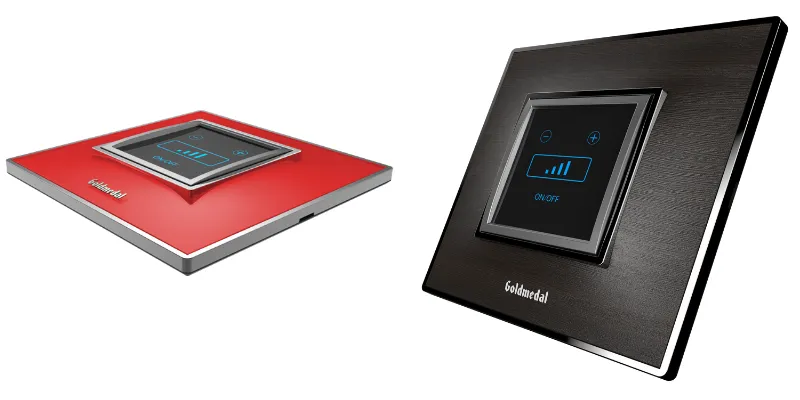From small dealers to large-scale manufacturers, how Goldmedal Electricals built a Rs 1,400 Cr turnover business
Starting with selling other brands and then getting into manufacturing switches and other electrical products, family business Goldmedal Electricals has been reshaped by every generation that has taken over the reins.

Bishan Jain (Director) and Kishan Jain (Director), Goldmedal Electricals
Kishan Jain’s grandfather Otmalji Goraji was first in the bangle family business in the City of Glass, Firozabad, Uttar Pradesh. But he had to leave it and look for other work to make ends meet. This was when he mulled getting into the electrical industry. Soon he moved his family to Vijayawada, Andhra Pradesh, to try his hand in something else. This was the beginning of his stupendous journey and the start of Goldmedal Electrical’s story.
Otmalji took the guidance of a relative who was already in the electrical business. Soon, along with his son and Kishan’s father, Jugraj Jain, he started trading in electrical switches and wires in a small shop in 1979 under the name Goldmedal Electrical, with a capital of Rs 2.5 lakh.
In an interaction with SMBStory, Kishan, who is the Director of Goldmedal Electrical, shares how from starting with trading in other brands the company entered the manufacturing segment to gradually dominate the Indian electrical industry.
The beginning
In 1979, Jugraj Jain and Otmalji started out by trading other brands like Anchor, Sona, SSK, and others. They used to make wholesale purchases of the switches and wires and sell after rebranding.
In 1980, Otmalji passed away and Jugraj took up the reins and spread the business to almost all the cities in Andhra Pradesh.
Kishan says,
After building a good network in Andhra Pradesh my father expanded the customer base for these brands vastly. And we were one of the first in the State to bring these brands very good sales.”
The transition phase
In 1995, Jugraj decided to hit the manufacturing segment. Goldmedal had already covered the Andhra Pradesh market and Jugraj thought why not manufacture own products rather than selling other brands. In 1995, he moved to Mumbai along with his family to set up his first factory as the city was a hub for quality products.”
Goldmedal started by manufacturing urea switches and explored the Karnataka market as well. Gradually, they started supplying their own manufactured switches in both Andhra Pradesh and Karnataka. They introduced border switches, wherein urea switches were given a border design. Kishan says that this was the beginning of Goldmedal’s pursuit of innovation to increase market reach.
In 1998, Kishan completed his graduation and joined his father in the business. Goldmedal underwent a radical transformation when the second-generation leader came on board. His foresight of investing in the expansion and modernisation of the company and infrastructure led to rapid growth in the product portfolio of the company.
I wanted to bring in innovation. The existing urea switches had limitations and I wanted to diversify into the market. Hence, for the first time, we introduced plastic,” Kishan shares on his early days at Goldmedal.
In 2001, the company began manufacturing polycarbonate switches and launched a series of 3-Magic, which soon gained prominence in the southern market, including Tamil Nadu and Kerala. A few years later, Kishan’s brother, Bishan Jain, also joined the family business, and since then, there has been no looking back.
Working on their mission to bring innovation in their products, Goldmedal launched locking system switches in 2007: if someone has to change the switches, they can do so by just removing the switches and not the entire plate, avoiding damage to the ceiling and walls. This was a breakthrough in their innovation, after which they were recognised across the country.

Goldmedal's itouch switches
Suing a brand for copying product
Kishan reveals that all the innovated products under their brand name have copyrights and design certificates. Recently, they even sued a brand for copying their product and won the case.
He says that in the electrical industry it is important to have a copyright of each design as there are high chances of your product getting copied.
Market reach
The year 2007 was a breakthrough in the company’s journey when they launched a variety of modular switches after starting from the traditional urea switches. Kishan says that they target electricians because they are the ones who use and install electrical products and if they are convinced it is easy to take hold of the market.
Initially we used a traditional approach in designing. Later, we used CAD/CAM and got a prototype, which made design innovations in the same model easier. We have designers from National Institute of Design in Ahmedabad who design modular switches for us.”
At present, besides regular switches, Goldmedal Electricals manufactures switches with music system and FM, Wi-Fi (retrofit) switches, stonewood switches, and glass plate switches with locking system. They manufacture a variety of modular switches that can operate on a touch, tap, or a swipe.
Buoyed by the impressive expansion, the urge to come up with something new lead Goldmedal Electricals to launch GIFA switches in 2014, thus making inroads in the ultra-premium segment. The GIFA switches, which are 5.5 mm and dust-free, have introduced in the country by Goldmedal. They launched a more economical series in GIFA switches in 2017.
Goldmedal Electrical products are now available across India, and the company has outlets across Ahmedabad, Vijayawada, Mumbai, Siliguri, and Hyderabad. The company manufactures not only switches but also wires, Miniature Circuit Braker (MCBs), LED, doorbells, power cubes, adaptors, extension cords, and other products. It also exports them to the UAE, Nepal, Bangladesh, and Bhutan.
The marketing in the Southern region is managed by Kishan’s father and his uncle, Praveen Jain.
Goldmedal has three units for manufacturing wires, pipes, and switches: one each in Bhiwadi, Vijaywada, and Mumbai. The company purchases most of the raw materials from Vadodara and Jamnagar, and import components from Taiwan.
Almost three decades down the lane, the company now has 20,000 dealers base across the country and employs more than 1,000 people in its company with 600 sales employees spread across various states. It has done installation projects with Hyatt and involved in Mumbai International Airport projects as well through a channel partner.
The company vies with the likes of Legrand and Panasonic, and has recorded Rs 1,400 Crore turnover in 2019.

Goldmedal wires
Digital journey
But for an electric company to stay afloat, it needs to go electronic too. This is why Goldmedal Electricals started building its own IT team four years ago and today, it is running on its own ERP system. The company has its own application where all the dealers can log on and view their transactions with the company. From catalogues, sales, payments to agent schedules, all information is available to the dealers at the tap of a button.
The way ahead
On future plans, Kishan says that Goldmedal is planning to launch another application where they can connect dealers and approximately 40,000 electricians in the database to benefit the segment.
He adds that they are trying to play around with the technology and innovate the modular switches where human intervention would be minimal. Two years down the lane they are planning to develop a product that would be a trendsetter, Kishan says.







